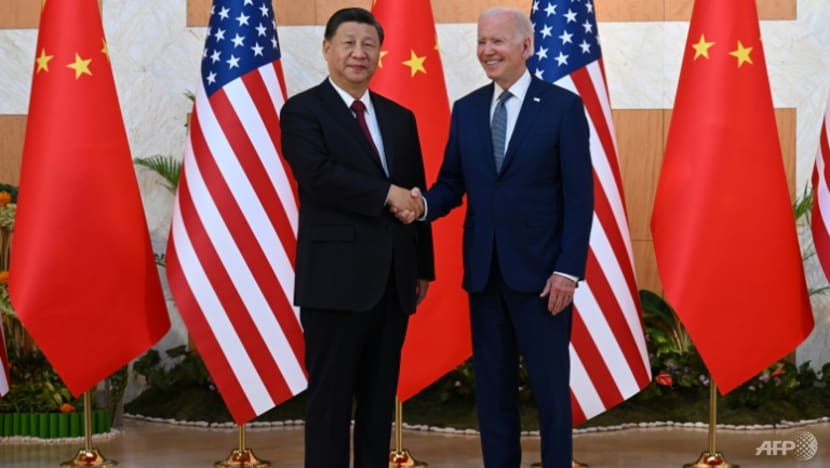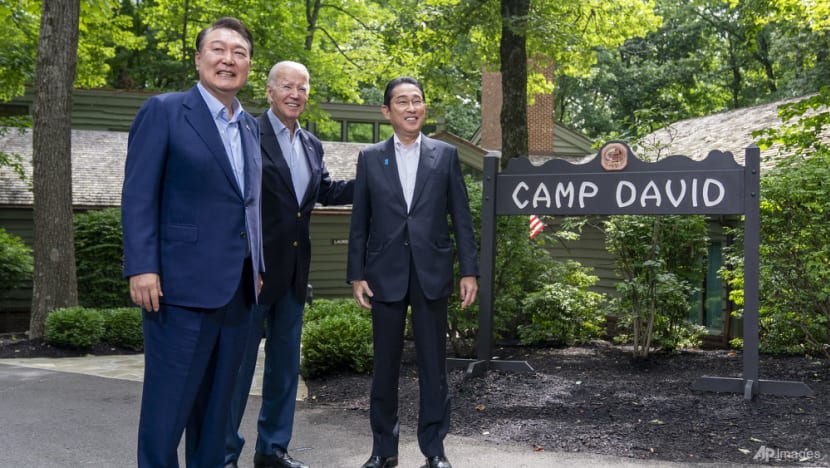The upside to dialogue between Washington and Beijing should never be overlooked, says the Financial Times’ Edward Luce.

WASHINGTON- For several nerve-jangling months this year, US-China relationsthreatened to spiral out of control. The odds are that the giants will relapse into high tension, or worse. In the meantime, they are becoming quietly reacquainted.
It is hard to put a value on a dialogue that is unlikely to yield big breakthroughs. All you can do is imagine the alternative. In today’s Middle East, America’s ability to talk to China could be the difference between a regional war and its absence.
The White House’s most urgent request to Wang Yi, China’s foreign minister, who arrived in Washington on Thursday (Oct 26), will be to restrain Iran. Should Hezbollah, Tehran’s proxy army, open a second battle front in Israel, the chances of one of the two US aircraft carriers in the region striking Iran will rise.
Were China still refusing to take America’s calls – as was the case five months ago – that risk would be greater. It remains far too high as it is. There can be no downside to spelling out face-to-face to Wang the costs of a spiralling conflagration.
JOE BIDEN’S UNEVEN RECORD ON CHINA
Joe Biden will get little credit for putting US-China relations on a less perilous footing. That is partly because it generates few headlines.
Three US Cabinet secretaries – the US secretaries of state, treasury and commerce – have been to China since mid-June. None yielded swooning deliverables. Yet thesewere three more visits than in Biden’s previous two and a half years combined.
Wang’s trip will be the first visit to Washington by a Chinese foreign minister since before the pandemic. It is likely to pave the way for Xi Jinping’s attendance at the Asia-Pacific Economic Cooperation (APEC) summit in San Francisco next month – the first trip to the US by China’s president in almost seven years.
Biden’s record has also been uneven. America’s shooting down in February of the Chinese spy balloon was a gift to caricaturists of America’s tendency to inflate threats.
Biden could also have stopped Nancy Pelosi, America’s outgoing Democrat speaker, from visiting Taiwan a year ago. Her trip needlessly stoked Chinese paranoia that the US was reconsidering its “One China” stance.
The only upside was to Pelosi’s domestic brand. Yet the chief blame for the freeze in bilateral relations belonged to China.
INVESTMENT IN ASIA-PACIFIC TIES SEND A CLEAR MESSAGE
Two things have given China pause to reconsider since then.
The first is that China’s much-expected pandemic rebound has not happened. Its economic doldrums are largely homemade. Having subjected the Chinese to periodic bouts of what felt like house arrest, Xi abruptly switched from zero-COVID to double COVID.
It is one thing to stifle people’s freedom of movement in a larger cause. It is another to pivot to herd immunity without explanation. The lockdowns triggered the country’s angriest disaffection in years and damped the economy’s animal spirits. Investors detest few things more than uncertainty.
Xi’s economic ineptitude has been hard to overstate. The same applies to his ability to frighten China’s neighbours.
The second change has thus been the speed with which the US has tightened its latticework of Asia-Pacific ties. Biden has re-established defence co-operation with the Philippines, launched a strategic partnership with Vietnam, encouraged Japan to double its defence spending, brokered a South Korea-Japan rapprochement at Camp David, and turned the Quad group with India, Australia and Japan into a feature of the landscape. There is also the 2021 AUKUS nuclear submarine deal with Australia and the United Kingdom.
None of these alone is game-changing. Collectively, they send a clear message.

A GREATER READINESS TO TALK
All this has taken place against downward revisions to China’s economic potential. The near universal expectation that China would soon overtake the US keeps being postponed by a decade or so.
The new consensus that China is stuck in a middle-income trap may be as overblown as the old one that world domination was around the corner. Nobody knows.
The important point is that China has at least temporarily lost that swagger about its ultimate destiny. All of which adds up to a greater readiness to talk.
Biden should be credited for exploiting these openings. It is doubtful his efforts will add a single point to his mediocre approval ratings. Again, however, it is worth comparing to the alternative.
Were China’s military still refusing to take America’s calls, the risk level in today’s hair trigger world would be far higher. That would add to global oil prices and subtract from Biden’s domestic ratings.
As Biden’s national security adviser, Jake Sullivan, this week pointed out: “High-level and repeated interaction is crucial to clear up misperception … and to arrest downward spirals that could erupt into a major crisis.”
Nothing fundamental has changed about US-China rivalry. Chinese vessels and aircraft continue to intimidate others in its vicinity. America is tightening curbs on outward investments to China, and further restricting Chinese investments in the US.
Xi could cross the line by supplying Russia with military materiel in its war on Ukraine. With some reason, Xi continues to think that America wants to keep China down.
The more they can converse, however, the lower the existential risk. By my count, Sullivan has spent about 20 hours talking to Wang in Vienna and Malta during the past few months, which is as much time as a patient might spend with their therapist.
It is harder to read bad faith into your adversary when they are objecting civilly to you in private.

Leave A Comment